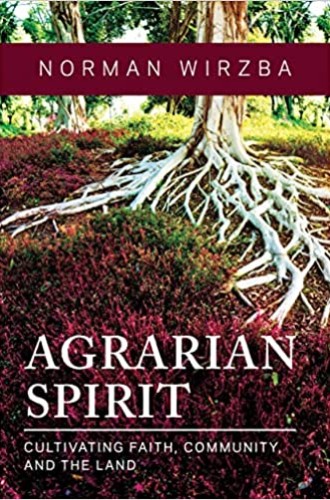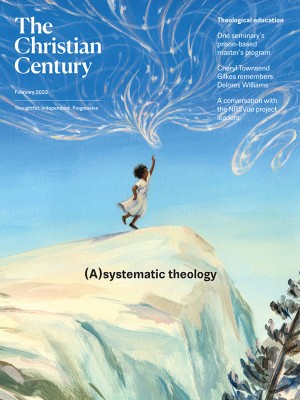In the face of climate change, how do we tend to our spirits?
In true agrarian fashion, Norm Wirzba suggests starting small.
I knew this would be a good book, and it is. In his typical clear style, Norman Wirzba takes complex philosophical arguments, agrarian practical insights, and solid theological teaching and mixes them together in accessible prose to encourage and challenge readers. From a preacher’s perspective, it will preach.
I knew this would be a good book, but I was disheartened when I received it. I was tired. After 33 years in the same small congregation, coming out of Covid and facing climate change, our young adults bunkered up with worry and older adults hunkered down with exhaustion, here comes this book about little things like mercy, kindness, and community. I didn’t want little; I wanted big. I shared the feeling of many who are weary of well-doing: when backed up against the sea with the enemy bearing down, we want the sea to part.
Read our latest issue or browse back issues.
I was looking for a fight, and Wirzba’s book showed up telling me about things like courtesy. Quoting Nicholas Lash, Wirzba writes that Christian discipleship is “schooling in the ways of creatureliness” where we learn “that courtesy to creatures is a way in which reverence for the Creator finds expression.” Wirzba goes on, “To believe that God is the Creator is to perceive all creatures as having their source and sustenance in God. . . . This is why courtesy before fellow creatures ought to be the daily, abiding human posture that governs our approach to those we meet.”
Not long before I read these words, a church member told me about coming out of the grocery store and witnessing an elderly Latino couple putting groceries in the trunk of their car while an angry White man drove up and harassed them by laying on his horn. The church member and another bystander put their own groceries down and intervened, helping the elderly couple with their groceries while purposely standing between the couple and the man in the car. The man drove away.
We don’t need to go looking for a fight because we’re already in one. Wirzba tells us that the big answer we want consists of little practices like courtesy and gentleness, mercy and humility. As God’s creatures we’re all related to one another, and our vocation is tending creation together. Social and political action plays a part, but the focus of this book is on our spirits.
Wirzba calls it the agrarian spirit. It’s not necessarily about becoming farmers or returning to the land, although it certainly includes such options. He writes:
The definitive marker of an agrarian is not being a farmer but being committed to the flourishing of people, fellow creatures, and land altogether. As such, agrarians are also committed to spiritual practices that are at once embodied, social, and economic and are focused on the healing of the earth that God has only and always loved.
Wirzba devotes three chapters to laying out with more specificity what agrarianism is and why it is important in this Anthropocene epoch, in which humanity is adversely affecting not only the planet’s climate but everything from microbes to mountain ranges.
In the final chapters, he offers us agrarian spiritual practices we need to not only survive but thrive in this Anthropocene world: prayer, learning to see, humility, generosity, and embracing our rootedness—habits that we must cultivate together. For those of us who have long read Wirzba, much of this is not new. Indeed, some of the chapters are extensive revisions of essays he published elsewhere. At the same time, this is an excellent introduction to his writing that offers a clear picture of what it means to have an agrarian spirit.
The book ends with a chapter on hope. Quoting Wendell Berry’s conviction that “hope lives in the means, not the ends,” Wirzba says we can’t worry over having it all figured out first. Instead, he says, let’s get to work nurturing and cultivating a different life, a connected life. Quoting Ecclesiastes 9:4, “Whoever is joined with all the living has hope,” he ends the book with the story of a couple in Alberta, Canada, who were raised on a traditional family farm that had moved into industrial agriculture. Eventually the couple committed to an agrarian way of farming. Over time, with much hard but good work, they transformed and brought healing to their small corner of the planet.
I wish this book gave us more such stories. We need these stories—not just farm stories, but stories of small towns and urban neighborhoods, congregations and communities, all cultivating an agrarian spirit of healing and hope. For example, Stamford, my small hometown in West Texas, is coming together to renew the town square with a local café, a restored movie theater, farmers’ markets, and other local businesses. Efforts like these in towns and cities by themselves will not solve climate change. But they will help people grow into connection with one another and creation. Together hope is discovered, and with hope comes renewed energy. We all could use that.






